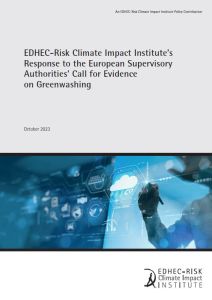

EDHEC-Risk Climate Impact Institute’s Response to the European Supervisory Authorities’ Call for Evidence on Greenwashing
The demand for investments integrating Environmental, Social, and Governance (ESG) dimensions has increased significantly in the past decade and the assets that financial intermediaries claim to ma ...
Author(s):
Summary:
The demand for investments integrating Environmental, Social, and Governance (ESG) dimensions has increased significantly in the past decade and the assets that financial intermediaries claim to manage responsibly and sustainably have close to trebled, reportedly growing to represent a third of overall assets under management.
However, the industry-accepted definition of sustainable and responsible investing is nothing if not inclusive (Ducoulombier, 2023). As incorporating ESG issues into investment management now suffices to claim the responsible investment badge, the industry welcomes a dazzling array of strategies with heterogeneous objectives, potential sustainability contributions, and methodologies. Furthermore, there remains considerable disagreement in respect of basic terminology across jurisdictions, voluntary standard setting bodies, and industry associations.
Regulation of sustainability claims and appropriate disclosures would be required to protect investors against disorienting and misleading claims and facilitate matching of investment products with sustainability preferences. Beyond investor protection, such regulation could accompany the integration of sustainability concerns by businesses through better capital allocation and stewardship.
For more than five years, the European Union has led the development of such regulation. In the wake of the sustainability and development commitments taken by the international community in 2015, the European Commission set to work on a sustainable finance masterplan. Published in March 2018, its Action Plan on Financing Sustainable Growth aimed to reorient capital flows towards sustainable investment, manage financial risks stemming from environmental challenges and social issues, and foster long-termism in economic activity.
Implementation followed swiftly with the European Union putting in place three major elements of a sustainable financial framework, i.e., a classification of sustainable activities (“Taxonomy Regulation”), a sustainability disclosure framework for non-financial and financial companies (respectively the “Corporate Sustainability Reporting Directive” a.k.a. CSRD and “Sustainable Finance Disclosure Regulation” a.k.a. SFDR), and investment tools, including climate benchmarks, a green bond standard, and specific expectations and disclosures for financial products promoting environmental or social characteristics or with sustainable investment as objective (SFDR Article 8 and 9 products, respectively).
In a 2021 update to its sustainable finance strategy, the European Commission represented that greenwashing, defined as “the use of marketing to portray an organisation’s products, activities or policies as environmentally friendly when they are not”, could not only generate reputational risks for those involved, but may also “trigger a loss of trust in sustainable finance products and the financial system.”
The Commission asserted that the legislator had established a sufficient framework of definitions, disclosures, and tools to adequately inform investment decisions. It emphasised the importance of shifting focus towards supervision and enforcement to protect investors and consumers against “unsubstantiated sustainability claims.” In this respect, it announced it would assess and review the powers, capabilities, and obligations of competent authorities to ensure they are fit for the purpose of combatting greenwashing (a practice for which the legislator to this date has yet to provide a generally applicable and binding definition).
2022 saw the International Organisation of Securities Commissions (whose 130 member jurisdictions regulate over 95% of the world’s securities markets) elevate the fight against greenwashing risk as a priority for regulators and policymakers. A record number of greenwashing allegations were recorded in a year that also saw the first greenwashing-related enforcement actions against financial institutions in several key jurisdictions.
In May 2022, the European Commission approached the authorities supervising the bloc’s financial sector for advice on greenwashing in the financial sector and its associated risks; supervision and enforcement; and possible adjustments to the regulatory framework – initial findings were expected after a year and final conclusions ordered for May 2024.
To inform their work the European Supervisory Authorities (ESAs) sought input from stakeholders, including through a Call for Evidence (CfE) to which EDHEC-Risk Climate Impact Institute responded in early 2023.
Register to download PDF
Register/Log in| Type : | EDHEC Publication |
|---|---|
| Date : | 16/02/2024 |

